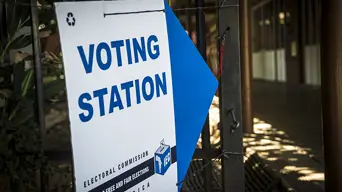Rights of South Africans living abroad at stake if they can't vote at a consulate near them - DA
The IEC has argued that these consulates have no state power and so cannot conduct an election.

FILE: A voting station sign during voter registration. Picture: EWN
JOHANNESBURG - The Democratic Alliance (DA) has argued that the rights of South Africans living abroad are at stake if the Electoral Court does not allow them to vote at a consulate near them.
The court has spent the day hearing the party’s application to have the IEC (Electoral Commission of South Africa) set up voting stations at honorary consulates.
The IEC has argued that these consulates have no state power and so cannot conduct an election.
The DA’s application comes on the back of South Africans in Perth, Australia not being able to cast their ballots at an honorary consulate near them but having to travel to the capital, Canberra.
Honorary consulates are usually set up in a country by business people in the host country, usually to drive trade and investment and to facilitate information.
They are usually run in a private facility but by private individuals.
The DA’s lawyer, advocate Michael Bishop, has argued that these consulates can be capacitated with staff from the official South African embassies to assist with voting, to enfranchise South Africans living abroad who would like to vote.
He said this would promote their constitutional rights.
But advocate Geoff Butlender has argued that there would be no way to ensure the integrity of votes cast at private consulates.
"The entire process will lie in private hands beyond the control of the commission of government."
Butlender has asked the court to dismiss the DA’s application, saying that while honorary consulates can be conferred with state power, as it stands, they have none.